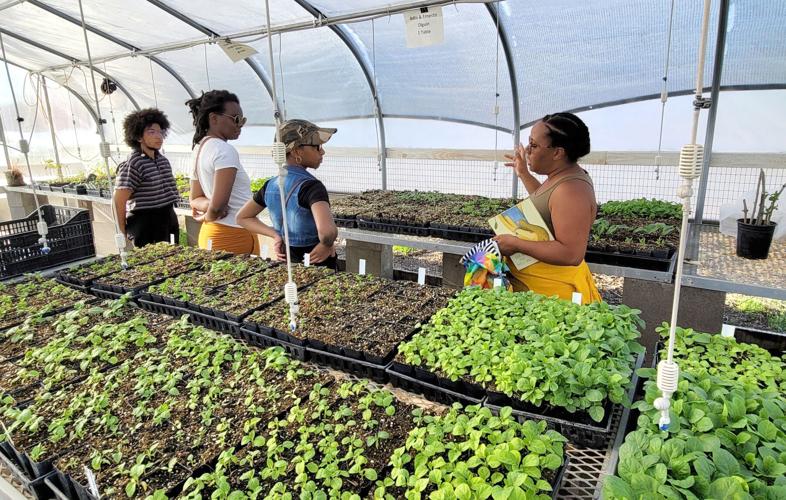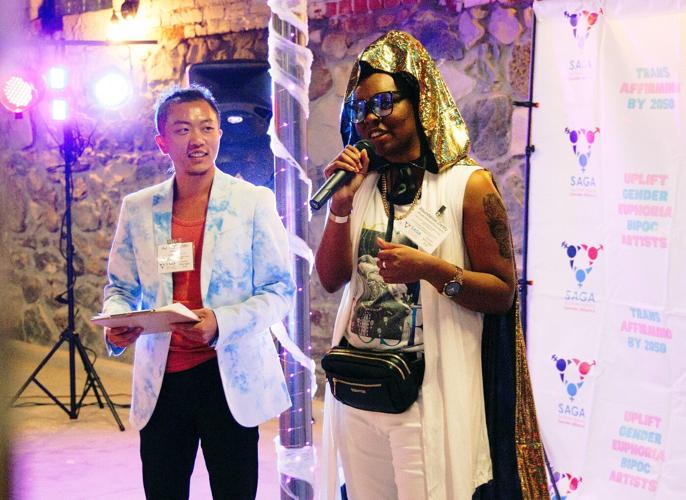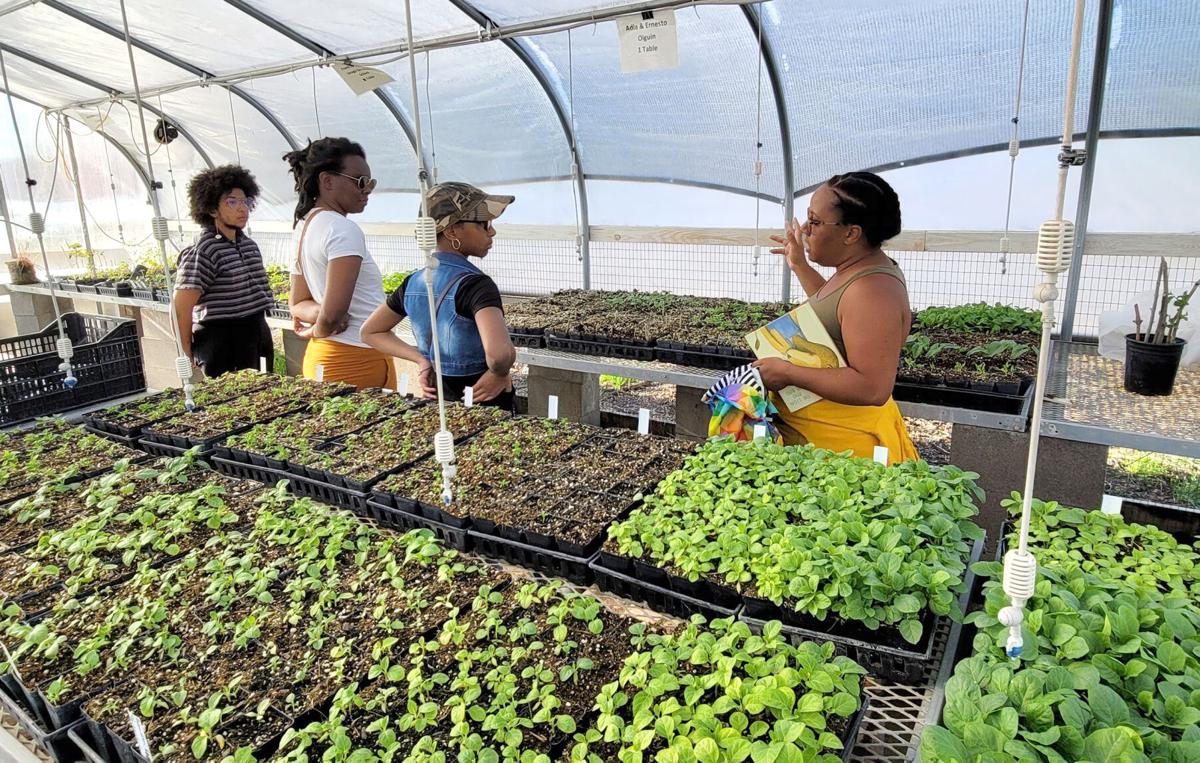A longstanding local nonprofit that supports transgender and gender-nonconforming people is doubling its staff, thanks in large part to singer Ariana Grande.
The Southern Arizona Gender Alliance was started in 1998 through Wingspan, a now-closed center that served lesbian, gay, bisexual and transgender communities.
For more than 20 years, SAGA has been the primary resource for information on transgender issues in the Southwest. The group also advocates for equal treatment and equal opportunity for transgender people, hosts regular support groups, and provides assistance navigating the process of updating documents to reflect a person’s new name and gender.
The group has done so on a shoestring budget and with a limited staff, but recent assistance by pop star Grande had a profound effect on the latter.
Advocating for rights of trans youth
In March, Grande took to Instagram, encouraging followers to donate to the Protect & Defend Trans Youth Fund.
She created the fundraiser with Pledge, a platform that helps distribute donations from individuals and businesses.
Grande agreed to match up to $1.5 million in donations, with the money raised supporting 18 preselected organizations that provide direct services and advocate for the rights of trans youth.
“Right now there are hundreds of disgraceful bills pending in state legislatures that target trans youth and aim to curb their rights,” Grande said in her post. “This will provide critical funds to organizations advocating for the rights of trans youth.”
The fundraiser kicked off March 31 — International Transgender Day of Visibility — and by April 10, more than $672,000 had been raised by 5,300 individuals, according to Pledge.
Grande continued to promote the campaign on social media and by the end had raised $3 million, including her match.
Pledge CEO James Citron said he was honored his company could help support the fundraiser. Pledge’s mission is to power generosity, he said.
Citron said that more than 6,000 people from every state in the nation and all around the world contributed to the campaign. The nonprofits received 100% of the money raised, because Pledge is free to use and recently started paying credit card processing fees.
“There are some incredible nonprofits out there, but they need the funding to achieve their mission,” Citron said.
Each group will receive roughly $167,000 as a result of the fundraiser.
In Tucson, the money will allow Southern Arizona Gender Alliance to create a more sustainable organization, said SAGA co-executive director and healing justice director Abundance Zaddy, who previously went by the name Tyrell Blacquemoss.
“These are really nice salary ranges that work within Tucson’s economy, and the jobs are still part-time,” Zaddy said.
The positions include a co-executive director, who will work alongside Zaddy; as well as a sustainable operations director, a grant writer consultant and creative director, and a communications/outreach manager.
“SAGA has a really long history and has been supporting and working to develop changes since its beginnings,” Zaddy said.
But in 2019, SAGA’s board realized it wasn’t serving transgender and gender-nonconforming people of color to the extent it could be, so it shifted up the board and made some hiring changes.
These included bringing on program director and events and volunteer coordinator AJ Tiedeman in 2020 as SAGA’s first employee of color, and Zaddy joining as its second employee of color in 2021, Tiedeman said.

AJ Tiedeman, left, and Abundance Zaddy give the opening remarks at SAGA’s first annual Cosmic Wine Night Fundraiser.
Zaddy moved to Tucson in 2017 after being homeless for roughly 18 months. The pandemic brought him to Tucson, a place he found “so welcoming.”
Once Zaddy found stability, he reached out to SAGA to find out how he could be of help, and Tiedeman responded, bringing Zaddy on to help with the trans care packages the group was distributing.
Zaddy’s role with the group expanded to teaching Black youth about herbalism and a short time later, he took over programming for the group. With years of experience working with nonprofits, it seemed like the perfect fit.
Gratitude, and grief
The pair worked to increase the budget, applying for grants and building relationships with funders and community members. The group now has five support groups and also offers workplace training and other types of assistance.
Its recent work has included educating community members about dangers of anti-transgender legislation, an increasing trend.
In 2022, 25 anti-LGBTQ+ bills were enacted, including 17 anti-transgender laws across 13 states, according to the Human Rights Coalition, an LGBTQ+ advocacy group. Overall, more than 145 anti-transgender bills were introduced across 34 states, the HRC reported.
The bills include bans on transgender youth playing sports or using bathrooms and locker rooms based on their gender identity, bans on doctors providing medically necessary and legal gender affirming care, and book bans and style laws restricting LGBTQ+ curriculum in schools, according to the HRC.
“Each of these bills aims to restrict the areas of public life where transgender people can freely and openly participate as their true selves,” the group said in its 2022 report.
With 17 of those anti-transgender bills introduced in Arizona during the last legislative session, Tiedeman said it was time to stand up and take action.
“We were doing a lot of behind-the-scenes work, organizing folks to send their testimony in,” Tiedeman said.
In late March, they received an email from Shauna Nep, executive director of the Braun Foundation and vice president of philanthropy for SB Projects, nonprofits started by Grande’s manager, Scooter Braun.
Nep let them know about the fundraiser and that the group had been selected as a recipient of the fund. The news, while exciting, was also bittersweet.
“It was a complicated time. We had just lost a trans friend, so getting this supportive news was difficult,” Tiedeman said. “But it was also a huge piece of hope and momentum.”
Zaddy said he was struck by gratitude, but also rage that this level of support for transgender lives was not the norm, despite the fact that transgender and gender nonconforming people have long experienced violence and discrimination.
Since January 2013, at least 304 transgender and gender nonconforming individuals have been victims of fatal violence, according to the Human Rights Coalition.
Last year, there were 34 recorded fatalities, including two who were killed in a November shooting at a Colorado Springs gay bar that left five dead and 17 others injured, according to the HRC.
The coalition also reported that Black transgender women made up 63% of all victims of fatal violence against transgender and gender nonconforming people and that in 2022, 85% of victims were people of color, 77% were under the age of 35 and 85% were transgender women.
“I had a lot of complicated emotions (about the fundraiser). It brought up grief of other friends I had lost that hadn’t brought on an outpouring of support,” Zaddy said.
The pair went to work managing their feelings and following up with the celebrities who had posted support on social media, including Laverne Cox and Elliot Page.
Focus on work-life balance
They also started looking into operational needs and the best way to use the funding, settling on adding staff positions. Tiedeman explained that while there are a lot of grants out there for programming and support, very few are for general operations.
Zaddy said they were thoughtful when creating the positions and benefits, trying to address as many individual needs as possible.
“When we say work-life balance, we mean more than that,” he said. “How do we create a workplace that centers people as whole human beings that have needs, including mental, emotional and spiritual?”
They are offering what they call great benefits, including eight weeks of paid time off, $5,000 to put toward professional development, $2,000 to attend conferences and more.
While the group’s focus for the start of the year will be hiring — applications for the new positions will be accepted through Jan. 23 — they’re also looking to provide more at-work training sessions and plan to focus in 2023 on educators and health-care providers.
“People reach out to us for trans-affirming trainings because they don’t have expertise on their teams,” Tiedeman said. “We bring our personal experiences, the relationships we’ve built with the community, and our ancestry.”
How to get involved
To view Southern Arizona Gender Alliance's open positions or to apply, click here. SAGA is accepting applications through 11:59 p.m. on Jan. 23. To learn more about SAGA, visit sagatucson.org.






